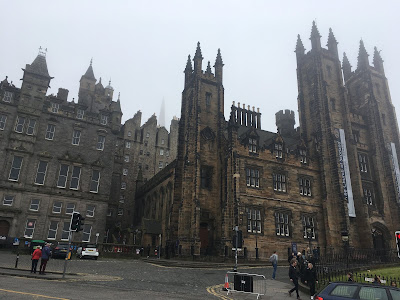"A Watson Fellow is someone who knows Plan B is better than Plan A."
This definition of a Watson Fellow was one of many offered to me this year. I had envisioned spending my final quarter in the far northern reaches of the Russian Arctic, visiting the lands of the caribou-herding Nenets people, touching the melting permafrost and asking questions about reemergence of anthrax. That plan caved in when Russia fell onto the US State Department's do-not-travel list, meaning I was no longer allowed to visit.
Plan B brought me to the historic castle-town of Edinburgh, Scotland. Of course I visited Tom Riddle's gravestone and the bookstore that inspired Flourish and Blotts (shout out to Evy Haroldson and Hermione fans everywhere). But my real reason for being here was the Planetary Health Alliance Second Annual Meeting.
 |
| A casual castle on the Edinburgh streets. |
 |
| Tom Riddle's gravestone. J. K. Rowling wrote much of the Harry Potter books here in Edinburgh. She must have found inspiration for naming her characters on foggy strolls through the headstones of Greyfriar's Kirk. |
 |
| So glad to be here as Plan B! |
The
Planetary Health Alliance is a consortium of nearly 100 universities, NGOs, research groups and government entities.
Founded in 2015, it's funded by the Rockefeller Foundation and housed at Harvard University. All that might sound inaccessible, but the concept of Planetary Health is common sense: we cannot separate the health of our land from that of our bodies.
Here's an infographic from the the
Lancet that does an incredible job summarizing Planetary Health. Click
here for a larger image.
I don't know about you, but when I get to the bottom of an infographic like that, I'm feeling amped and ready to commit my life to this cause!
Unlike most biology conferences I've attended, the Planetary Health Alliance conference was held as a plenary, meaning that everyone attended every talk. The auditorium was old, but it wasn't any old auditorium -- picture an expansive dome, vaulted ceilings covered with murals, and seats that Charles Darwin himself occupied when he studied medicine right here at the University of Edinburgh.
 |
| The University of Edinburgh auditorium where Charles Darwin began (and flunked out of) medical school. |
As part of the #scicomm and #sciart movements, I sketch-noted all the talks with ink and watercolor. Here they are for you to enjoy. I can never capture the entirety of a talk in these notes, so if you're curious to know more about anything, please comment. I hope you get a taste of the week's energy, motion, and commitment to staying with the trouble.
-Nina
P.S. Click on a photo to make it bigger!
 |
| Welcome, Keynote Address, Panel |
 |
| Welcome, Keynote Address, Panel |
 |
| Welcome, Keynote Address, Panel |
 |
| Session I: Food, Nutrition and Environmental Change |
 |
| Session I: Food, Nutrition and Environmental Change |
 |
| Session II: Mental Health and Noncommunicable Disease Impacts of Environmental Change |
 |
| Session II: Mental Health and Noncommunicable Disease Impacts of Environmental Change |
 |
| Session III: Infectious Disease, Animals, Agriculture and Environmental Change |
 |
| Session III: Infectious Disease, Animals, Agriculture and Environmental Change |
 |
| Session III: Infectious Disease, Animals, Agriculture and Environmental Change |
 |
| Session IV: Solution Space — Faith Traditions, Indigenous Voices and the Arts: Rethinking our Place in the World |
 |
| Session V: Lightning Sessions on New Ideas in Planetary Health |
 |
| Session V (continued) and Solution Space: Creating and Collaborating |
 |
| Session VI: Solution Space: Governance and Policy Solutions |
 |
| Session VI: Solution Space: Governance and Policy Solutions |
 |
| Day 3 Opening Session |
 |
| Session VII: Economic and Business Solutions to Planetary Health Problems |
 |
| Session VIII: Blue Planetary Health |


























